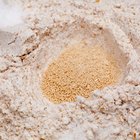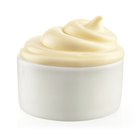
Doctors and dietitians consider most vegetable-based oils to be healthy fats, but some are healthier than others. For example, olive oil is widely valued for its high levels of heart-healthy monounsaturated fats. If you're trying to use more olive oil for health reasons, consider using it in your baking in place of butter or other oils. Some specific recipes call for strongly flavored olive oils, but for general baking or a boxed cake mix, you're better off using an extra light olive oil.
Olive Oil Production
The olive oil producers of the Mediterranean have spent thousands of years learning how to extract oil from the fruit, and the results vary widely depending on which process they use. The traditional method simply squashes the olives and catches the oil that runs out. That's cold-pressing, and results in virgin or extra-virgin olive oil. Soaking olive pulp in hot water and removing the oil with a centrifuge results in mid-flavored "ordinary" olive oil. The most thorough process uses powerful solvents to extract every trace of oil from the fruit. This oil is highly filtered to remove the solvents, and results in a very mild or "extra-light" oil.
Olive Oil for Baking
In areas where olives are grown, the oil is used even for baking and desserts. Some regional cake recipes feature the rich flavor of a virgin olive oil, usually combined with lemon to bring out the oil's fruitiness. For normal baking, extra-light varieties are a better choice. Their flavor is neutral, like other vegetable oils, and it will not affect the taste of your cake. Most major brands offer an extra-light variety, so if you don't currently keep one in your cupboard it will be easy to find on your next trip to the supermarket.
In Your Mix
Using olive oil with a boxed cake mix couldn't be simpler. All vegetable oils are used in the same way, so you just have to measure the amount of oil called for in the instructions on your box. Usually, that ranges from two-thirds of a cup to a full cup of oil. Add the eggs and the water or milk called for in the instructions, mix up your batter, and bake the cake normally until the center is springy and a cake tester inserted into the middle comes out clean.
The Result
You might be pleasantly surprised at the result. Although olive oil's health benefits are a common motivation for baking with it, it also does good things for your cakes. Olive oil -- like egg yolks -- contains natural emulsifiers. That means the other ingredients will blend more thoroughly when you substitute olive oil, and produce a cake with a softer, moister crumb than other oils. If you run out of extra-light olive oil, a mid-flavored "ordinary" olive oil can be used in spice cakes, carrot cakes or rich chocolate cakes where its flavor is concealed by the other ingredients.
Related Articles

Cake Mix Alternative for Oil

How Much Melted Shortening Do I Use in ...

Can You Use Olive Oil in a Bread Mix?

Can I Substitute Olive Oil for ...

What Kind of Oil Do You Use in Brownie ...

Does Canola Oil Taste the Same as ...

How to Add Fruit Puree to Cake Mixes

What Does Adding Applesauce to Cake Mix ...

Canola Oil Vs. Lard in Baking

Can I Use Pudding Instead of Oil in ...

Healthy Cake Mix Substitute

How to Use Shortening Instead of Oil ...

Substitutes for White Truffle Oil

How to Adjust the Moisture in a Yellow ...

How to Bake a Really Moist Boxed Cake

How to Substitute Pumpkin for Oil

What Is Expeller Pressed Canola Oil?

Can I Put Butter in Brownie Mix Instead ...

Does High Altitude Make a Difference ...

Can I Use Mayo Instead of Eggs to Make ...
References
- On Food and Cooking: The Science and Lore of the Kitchen; Harold McGee
- The Toledo Blade: Baking With Olive Oil
- Fine Cooking: The Secret Ingredient for Tender Cakes
- Pompeian Olive Oil: Olive Oil FAQ
Writer Bio
Fred Decker is a trained chef and certified food-safety trainer. Decker wrote for the Saint John, New Brunswick Telegraph-Journal, and has been published in Canada's Hospitality and Foodservice magazine. He's held positions selling computers, insurance and mutual funds, and was educated at Memorial University of Newfoundland and the Northern Alberta Institute of Technology.
Photo Credits
Goodshoot/Goodshoot/Getty Images